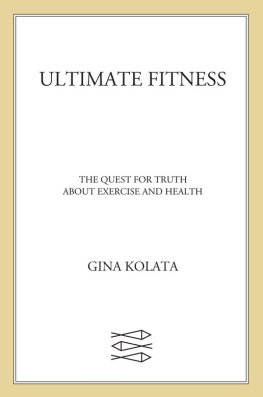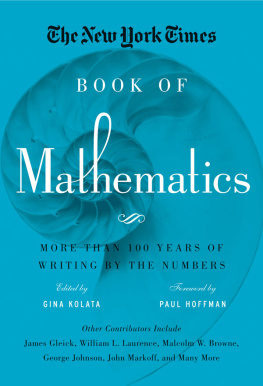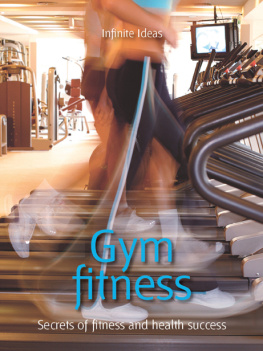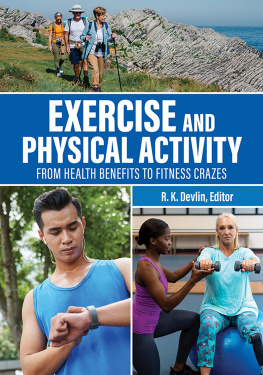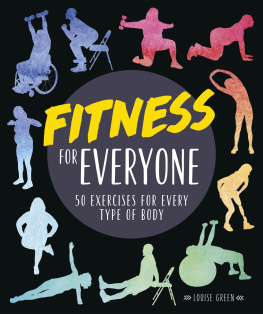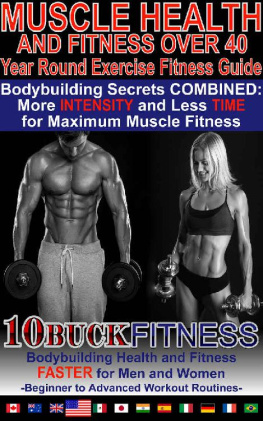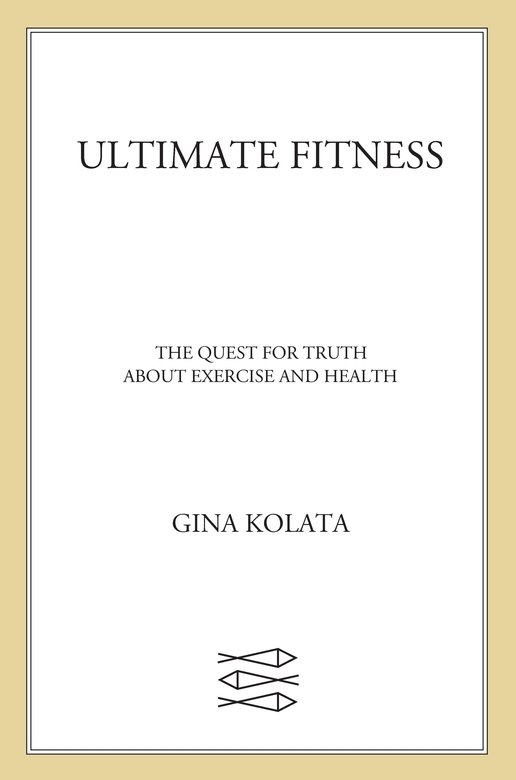I set out to learn about fitness, exercise, and health knowing I would need help from many medical and scientific experts and ordinary people. I discovered that the patience, thoughtfulness, and generosity of those I contacted knew no bounds. Virtually every living person mentioned in this book deserves my thanks for their gracious assistance.
In addition, I would like to extend special thanks to a few individuals who spent an extraordinary amount of time and effort answering my questions and helping me to check facts, and who provided uniquely valuable perspectives and resources. They include historians John Fair and Jan Todd, exercise physiologists Steve Blair, Dave Costill, Bill Haskell, and William Kraemer, cardiologists Mike Lauer and Paul Thompson, psychopharmacologist Richard Friedman, and obesity researcher and geneticist Claude Bouchard. I am grateful to my friends, who readily agreed to let me tell their stories, and especially to Cynthia.
I also thank my agent, John Brockman, who suggested that I write a book about exercise, and my editor, John Glusman, who saw what this book could be and whose insightful suggestions were an invaluable guide in shaping its content and tone. Finally, I thank my husband, Bill, who listened patiently as I endlessly discussed the book, who offered helpful comments, and who read draft after draft.
Science reporter for The New York Times, Gina Kolata is the author of four previous books, most recently, Flu: The Story of the Great Influenza Pandemic of 1918 and the Search for the Virus That Caused It (FSG, 1999). She has been the recipient of numerous awards for her work, including an award from the American Medical Writers Association, the Susan G. Komen Foundations media award for reporting on womens issues and breast cancer, and the 1995 award by the American Mathematics Association for reporting on mathematics; and, in 2000, she was a Pulitzer Prize finalist in investigative reporting. She lives in Princeton, New Jersey, where she and her husband spend much of their spare time exercising, as do their son and daughter.
THE TRUTH ABOUT EXERCISE
I dont give health advice, I like to tell anyone who asks. Im a reporter, not a doctor, not a scientist. My job is just to give you the information that might allow you to think for yourself. If theres one group that annoys me its the self-appointed people who act like health police, who shake their heads in dismay at those who do not eat or exercise just as they do, and who explain in all earnestness that they are protecting themselves from cancer by eating blueberries or tomatoes or that they are full of energy because they walk a mile each morning. I once met a retired police officer while reporting for the New York Times who asked me to feel his bicep. Proof, he said, that he was healthy, that he took care of himself, unlike those fat and sloppy masses out there.
But maybe the fitness arena is different from medicine, my usual focus. Now that I have come to appreciate the sketchiness of fitness science and the breadth of fitness marketing, I have a few answers for people who ask me: What should I do to get fit?
If I learned anything from investigating the exercise field, it is that good research often gets lost amidst marketing claims and exaggerations and the sale of dubious programs and nostrums. Yet there is valid research that can be trusted. This is research conducted not for marketing purposes but for the purposes of scientific inquiry. It involves studies that include control groups andthat look for results that are statistically significant, that are highly unlikely to have occurred by chance. It tends to be done by academic researchers who want to learn the truth, not to prove a pet hypothesis (or a commercially driven hypothesis). That means that they are as willing to say that a hoped-for benefit did not emerge as that it did.
So if someone wants to start exercising, I would suggest paying attention to studies that have these hallmarks of validity. And then I would ask: What are you trying to accomplish? And why? There seem to be three principal reasons for exercising, and what is needed for one goal is not necessarily what is needed for another.
If your goal is to improve your health, studies in recent years have consistently indicated that you get the most benefit when you go from no exercise at all to exercising moderately. Starting with Steve Blairs classic study Physical Fitness and All-Cause Mortality (1989), a convincing body of research has emerged in support of the observation that most of the health benefit probably occurs from just mild exercise, not necessarily from the most arduous workouts.
The good news is that what the researchers call moderate exercise really is moderate. Most health benefits seem to accrue if you simply walk briskly for about 20 to 30 minutes a day, covering a mile in 15 to 20 minutes, or ride a bike at a modest pace. You can take three 10-minute walks a day, or you can ride a bike for 20 minutes and walk for 10. Or you can swim at a comfortable pace for all or part of your exercise program. Almost any physical activity will suffice, and there is no need to push yourself till youre out of breath, gasping for air. You dont have to return from your session soaked in sweat. Yes, you do get a slight extra benefit from exercising a little harder or a little longer, but that extra benefit is small compared to the benefit you apparently get from just doing moderate exercise.
As Michael Lauer, the Cleveland Clinic cardiologist, tells me, Riding a bike can be a lot of fun, but you might think that the only way to get a cardiovascular benefit would be to ride forthirty miles a day. The point isno, thats not correct. You can take a thirty-minute easy bike ride and still get a real cardiovascular benefit. What we are asking for, he clarified, are very mild levels of activity, but they need to occur pretty often.
When it comes to the benefits of strength training, the extensive body of evidence in the position paper written by the American College of Sports Medicine documents that it can improve muscle strength, make everyday life easier, and prevent falls. Decades of research by exercise physiologists show that resistance exercise can change the muscle cells in positive ways. As Claude Bouchard, for example, confirmed in his large study of inherited differences in the ability to train, muscle that is developed with exercise is more efficient, has more mitochondria, and is better at using fat for fuel and at allowing cells to use insulin to utilize blood sugar, thus making diabetes less likely.
But it is not easy to walk into a weight room at a gym and just start lifting.
For advice on how to do it, I defer to William Kraemer, one of the leading experts on strength training, editor of a scientific journal on the subject, and lead author of the position statement on strength training by the American College of Sports Medicine. I asked him if novices would do well to read books or magazines like Shape , or Mens Health, or Muscle & Fitness .
Not an easy answermaybe all of them, if they can get accurate information and not become a victim to infomercial hype and inaccurate information, Kraemer replied. Its a jungle out there, and each individual has different needs, so start with an organization like the National Strength and Conditioning Association (a nonprofit professional group with headquarters in Colorado Springs and a Web site, nsca-lift.org ). Do not be afraid to challenge yourself and think, he insists. Information should be evaluated and its source should be known.

